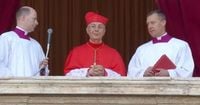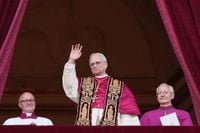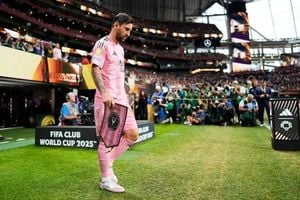In a historic moment for the Catholic Church, American Cardinal Robert Francis Prevost has been elected as the 267th pope, taking the name Pope Leo XIV. This election marks a significant milestone, as Prevost becomes the first American pope in the 2,000-year history of the Vatican. The announcement came after a swift conclave lasting just over 24 hours, culminating in white smoke rising from the Sistine Chapel chimney at 18:07 CET on May 8, 2025, signaling the cardinals' decision.
The election was confirmed by Cardinal Dominique Mamberti, who announced, "Habemus papam"—Latin for "We have a Pope"—to the eager crowds gathered in St. Peter's Square. The new pontiff, aged 69, was met with cheers and applause as he made his first appearance on the balcony, dressed in traditional papal attire, a stark contrast to the more casual style adopted by his predecessor, Pope Francis.
Pope Leo XIV's choice of name is a nod to both tradition and history, honoring the legacy of Saint Leo the Great and Pope Leo XIII, who played a pivotal role in the Church's social doctrine. Father Ed Tomlinson, a Catholic priest from the UK, remarked on the significance of the name, stating, "The papal name Leo unsurprisingly shows a Pope who is going to be strong during a time of crisis, historically."
Prevost's election was not without its challenges. The conclave, which included 133 cardinals—the largest ever gathered for such an event—saw a diverse group struggling to reach consensus amid differing opinions on the future direction of the Church. The cardinals needed a two-thirds majority, or 89 votes, to elect the new pope. After an initial round of voting produced no results, the cardinals reconvened for a second conclave, ultimately leading to the swift election of Prevost.
Born in Chicago on September 14, 1955, Prevost has spent much of his career as a missionary in Peru, where he became well-respected for his work and dedication to the Church. He was appointed as the prefect of the Dicastery for Bishops in 2023, a position that involves overseeing the nomination of bishops worldwide. This role placed him in a significant position of influence leading into the conclave.
Despite being American, Prevost's extensive experience in Peru has helped him transcend national boundaries, making him a candidate who resonates with a global audience. His dual citizenship—American and Peruvian—adds to his unique profile as a leader who understands the complexities of both cultures. He has been described as a polyglot, fluent in several languages, including Spanish and Italian, which further enhances his ability to connect with a diverse congregation.
In his first address from the balcony, Pope Leo XIV emphasized themes of peace and unity, stating, "I want to thank all my brother cardinals who have chosen me to be the successor of Peter and to walk together with you as a united church, always seeking peace and justice." His message resonated deeply with the faithful, many of whom were eager to hear how he would steer the Church following the tenure of Pope Francis, who was known for his progressive approach.
The election of Prevost has sparked discussions among the faithful about what it means to have an American pope during a time of significant social and political change. Chicagoans celebrated the news, with local leaders expressing pride in their native son. Father William Lego, who studied alongside Prevost, remarked, "They picked a good man. He always had that sense of being conscious of the poor and trying to help them."
However, the election has also drawn mixed reactions. Some expressed hope that an American pope could bridge gaps between the United States and Europe, especially in light of current political tensions. Francesco Saverio Tiberi, an 18-year-old student from Rome, noted, "With the social and political situation with Trump, I think it’s a good thing. Maybe an American pope can do something to help relations between Italy, Europe and America."
As the first American pope, Prevost's leadership will inevitably be scrutinized, particularly regarding his stance on issues such as inclusion and LGBTQ+ rights within the Church. While he has not made explicit statements on these topics since his election, his past comments have raised concerns among some progressive Catholics. In a 2012 address, he criticized Western media for promoting views he deemed contrary to the Gospel, mentioning the "homosexual lifestyle" and alternative family structures.
Prevost's election comes at a time when Catholicism in the United States faces both challenges and opportunities. With 20 percent of American adults identifying as Catholic, the Church is at a crossroads, and the new pope's decisions will likely have lasting implications. The Archdiocese of Chicago reports that one in three residents in the area are Catholic, underscoring the significance of Prevost's election for the local community.
In the wake of his election, Prevost will face pressing issues inherited from his predecessor, including the ongoing need for reform within the Church and the handling of sexual abuse cases. His past role in the Vatican's office of bishops, where he oversaw significant reforms including the inclusion of women in the bishop nomination process, positions him as a potentially progressive leader willing to continue evolving the Church's practices.
As crowds gathered to witness this historic moment, many expressed hope that Pope Leo XIV would embody the spirit of compassion and inclusivity that characterized Pope Francis's papacy. The coming weeks and months will reveal how Prevost intends to navigate the complexities of leading the world's 1.4 billion Catholics, and whether he will maintain the momentum of reform initiated by his predecessor or chart a new course altogether.





